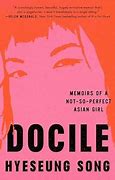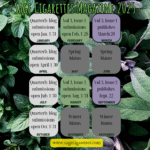by Chris McElroy

“By the time I reached the foot of the mountain, I knew I would do what my mother wanted.” After a lifetime of struggling to meet her mother’s impossible expectations, Hyeseung Song recounts her constant internal battle to either please her Korean immigrant parents and follow the path they have set for her or break free and discover her true self.
In her book Docile: Memoirs of a Not-So-Perfect-Asian Girl, she begins by reflecting on her life beginning in her Texas childhood. Despite wishing she could fit in with her American peers, Song is held back by her mother’s desire for a perfect, intelligent, high-achieving daughter. Raised with the expectation that if her parents become happy, she will become happy, she ignores her own wants and needs in favor of her mother’s dreams. She pushes herself above and beyond in school, but no matter how hard she works she never manages to win her mother’s approval. In math she was “skipping a grade, in honors, and making straight As,” yet when she didn’t win an award for it at the end of the school year, all her mother could say was “Maybe next year you can get the math award, too.”
A stark example of the model minority myth, Song studies at Princeton and Harvard Universities, but her yearning for a simple, artistic life slowly rips her apart from the inside out. Upon failing to find her place in the ivy league, she tries to take time off from school. Not understanding her struggle with mental health, her mother says, “You don’t know what you want. You need to be challenged so you can be grateful for what you have.” Against her wishes to live a simple life in Chicago above a bakery, her parents send her to Korea to work, where she deals with cultural clashes, sexual assault, and being an outsider. After returning to America, her parents once again send her off against her wishes, this time to Harvard Law School, where she miserably struggles with mental health and massive workloads. Time after time, Song is tossed about in the vicious cycle of following her parent’s direction, failing to find happiness, and facing pain and abuse as a result. When a suicide attempt leaves her empty and hopeless, Song finally goes on a heart wrenching journey to find a life of meaning and contentment outside of her parent’s plans.
Throughout her journey she loses everything from her career to her marriage, and more. She continues to suffer and the hands of her mental illness, but among this pain she finds a light in her love of the arts. She took up painting, and in that she started to find herself. “When I painted, I heard only my voice, no one else’s.” Later, she moves to New York City and finally finds the life she wanted. She still had to work hard to earn money, but living in the city was her dream, “I never wanted to leave.” Despite her eventual struggle through divorce and her mother’s death, she had finally found who she was.
Song’s memoir dismantles the idea that academic success will bring a life of satisfaction and serves as a reminder to follow your own dreams – not the dreams of others. She masterfully intertwines her battles with mental health, toxic parental relationships, cultural expectations, and the overarching goal of learning to be yourself.
Chris McElroy is a student at the University of Tampa.



Add your first comment to this post